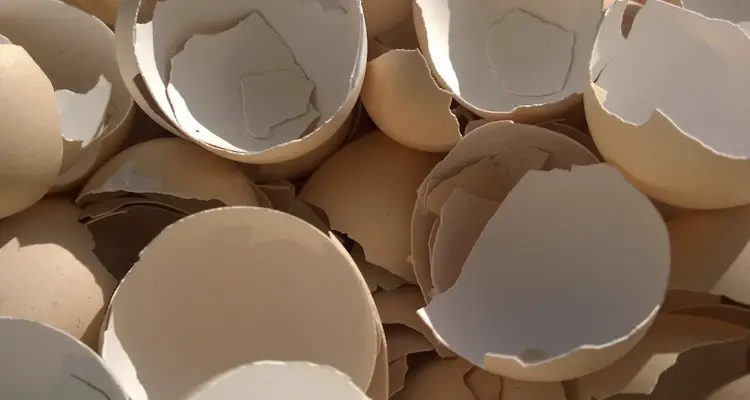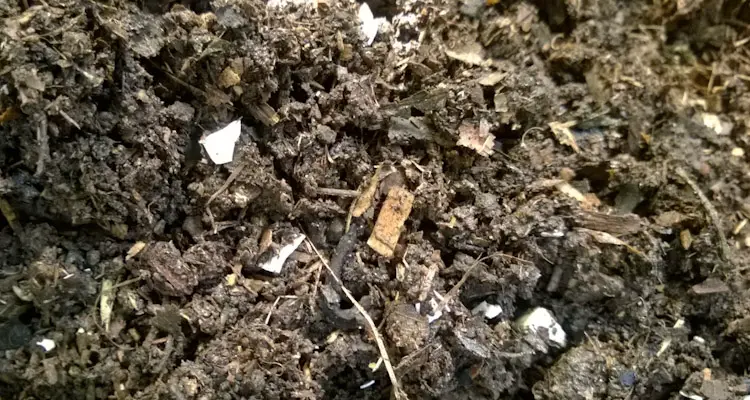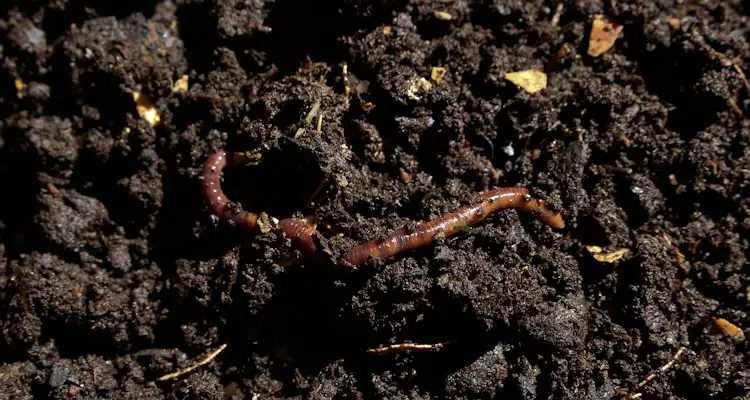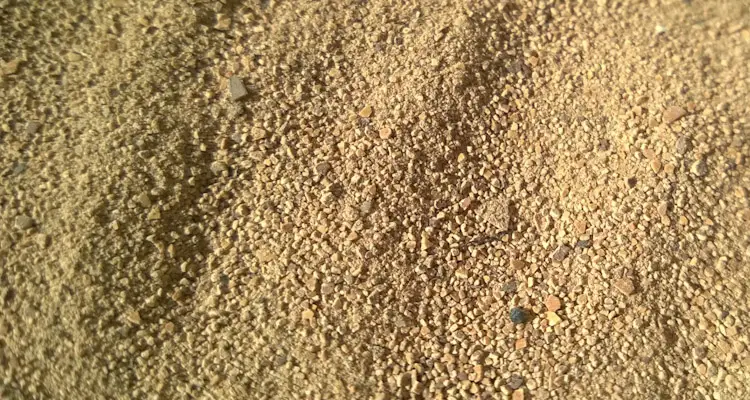I was sifting some compost from a heap and noticed that most of the eggshells were still intact. The pile was there for over a year. So, I wondered, how long does it take for eggshells to decompose?
I looked it up.
Eggshells take between 5 to 10 years to decompose if finely crushed and applied to microbe-rich, acidic soil. However, under normal conditions, eggshells do not readily break down but can remain visible in the soil for over 100 years; and have been found fully intact on archeological digs.
In this article, we’ll take a closer look at some interesting facts and myths about eggshells and how you can use them in gardening.
Let’s dive in.
Why Do Eggshells Not Decompose?
Eggshells seemingly do not decompose, or for the very least, would take a few lifetimes to verify the process.
Eggshells are made up mainly of calcium carbonate (CaCO3), which is a stable mineral compound. It is brittle and can easily be broken into smaller pieces but does not readily release its components.

As a result, the calcium in eggshells is not water-soluble but requires an acidic solution to dissolve.
In the absence of an acidic chemical reaction, the shells remain intact. In fact, in a recent 5-years study, eggshells remained unchanged in a compost bin.
What Happens To Eggshells In The Garden?
You should crush eggshells before you add them to the soil to get the most out of them. However, even if you do not break them into smaller pieces before you add them to the garden, they will still seem to disappear over time.
In the garden, eggshells experience physical disturbances and chemical reactions from the soil and the rain.
Eggshells are brittle and break down into fine pieces through normal tilling as well as other soil disturbances which occur during soil preparation.
In acidic soil, powdered eggshells act as a liming agent, raising the soil’s PH. During this reaction, the shells dissolve, and calcium is made available to plants.
Rainwater forms a weak acidic solution when it reacts with Carbon Dioxide. This weak acid slowly leeches calcium away from shells over time, similar to its action on limestone.
This reaction can take decades or even centuries, depending on the acid form and the surface area of the shell.
In other words, finely crushed eggshells react and dissolve faster when exposed to acid.
Do Eggshells Decompose In Compost?
Years ago, I came across the advice to add eggshells to my compost heap. However, like many other composters, I noticed that the eggshells were still visible even after a few years in neglected piles.
Initially, calcium leaches from eggshells during the short-lived acidic stage of the compost. This process stops as the compost ages and becomes neutral.
If left untouched, most of the eggshells will remain intact. However, the shells break down into smaller pieces as the compost turns.

At this point, you would expect microorganisms to break the shells down. However, these microbes mainly work on the inner protein lining but ignore the outer shell since it is more or less inorganic.
As the compost ages, insects and earthworms migrate towards the compost and continue the breakdown process; but ignores eggshells for the most part.
Do Earthworms Help Break Down Eggshells?
My friend built a DIY worm farm and filled it with eggshells. Someone told him that earthworms help to decompose eggshells, but do they?
As you may already know, earthworms do not use teeth to chew their food. Instead, they use small particles, referred to as grit, to help break up their food. These particles can be anything from small sand particles to eggshells.

During the process, the particles break into smaller bits and pieces. This process does little to release calcium since earthworms have alkaline digestive juices. However, by further crushing the shells, they become easier to break down if conditions are right.
Eggshells need to be finely crushed for earthworms to ingest. Otherwise, the worms will ignore the larger pieces altogether.
What’s The Best Way To Use Eggshells In The Garden?
Many people promote the use of Eggshells in the garden. They claim that eggshells will add calcium to the soil. However, this is true only to a certain degree. So what are the best ways to use eggshells in the garden?
- Powdered Eggshells – You can use powdered eggshells as a liming agent for acidic soil. It provides additional calcium as it reacts and balances the soil’s PH.
The smaller particles react more effectively. As a result, you should crush shells into a powder before applying.
- Water Soluble Calcium (WS-Ca) – The calcium from the eggshells can be made available to plants by applying a weak acid, such as vinegar.
You can dilute and apply the resulting solution directly to plants as a foliar application.
As noted before, eggshells are not water-soluble. As a result, they require a form of acid to release calcium and other minerals. In the absence of this acid, the shell remains intact, and little or no calcium is released.

How To Make and Use Water Soluble Calcium (WS-Ca)?
I first came across the idea of water-soluble calcium, used in Korean Natural Farming, while researching how to treat end rot in my Roma Tomatoes. I’ve never thrown away eggshells ever since.
Here is a simple method to make WS-Ca. You will need eggshells and some white vinegar.
- Collect as many eggshells as you can. It can take a few months.
- Crush the shells into fine pieces. Blend into a powder, if possible. Wear a mask when blending.
- Heat the crushed eggshells in a thick pot. Turn it often until it becomes dark brown.
- Measure the amount of powder using a measuring cup. Place this into a bottle.
- Add ten times the amount of vinegar to the bottle with the eggshells. For example, If you have 25ml of eggshells, add 250ml of vinegar.
Note: Ensure you use a large enough bottle because the reaction will foam up quite a bit at first.
- Cover the bottle with a paper towel and put it aside for up to 10 days.
- After ten days, you can pour out the liquid into a bottle for storage. The resulting solution is highly concentrated but neutral.
Note: The remaining eggshells can be added to compost or directly to the garden.
You need to dilute water-soluble calcium in the ratio of 1 part WCA to 1000 parts water: or 1 ml to 1 liter. You can modify the dilution to suit the plant or growing.
You can apply the solution to the leaves of the plants.
Note: Most soils already contain more than enough calcium needed by plants. However, due to one issue or another, it is not available for use by the plants through their roots. The foliar application of calcium bypasses these issues and ensures that the plant receives the nutrients that it needs.
Final Thoughts
There are many myths about eggshells and their use in the garden. While these may be true under specific conditions, they are, for the most part, folklore.
The same is evident when it comes to how long it takes for eggshells to decompose.
While some people report that it takes a few years, most will state from experience that they do not decompose at all, even after decades.
As for me, I belong to the latter camp. I am yet to see actual evidence of eggshells decomposing under normal conditions in my area.
However, I have also adapted the methods of crushing and WCA to get the best benefits from the shells.
Related Questions
What Benefits Are Eggshells In Worm Bins?
Earthworms use the surface of larger pieces of shell to scrape off their eggs when laying. You can also give finely crushed eggshells to earthworms as grit to help digest their food.
Are Eggshells Organic or Inorganic?
Eggshells are organic for the most part. They compose of a soft inner lining, made of protein, and a hard shell. However, this hard shell is made primarily of a mineral compound, calcium carbonate, which is a mineral and classified as inorganic.
References
Scielo. Characterisation Of Avian Eggshells Waste… Scielo.br. Accessed August, 2021
Kathryn Lamzik…Analysis Of Avian Fauna And Eggshells… Tennessee.edu. Accessed August, 2021
